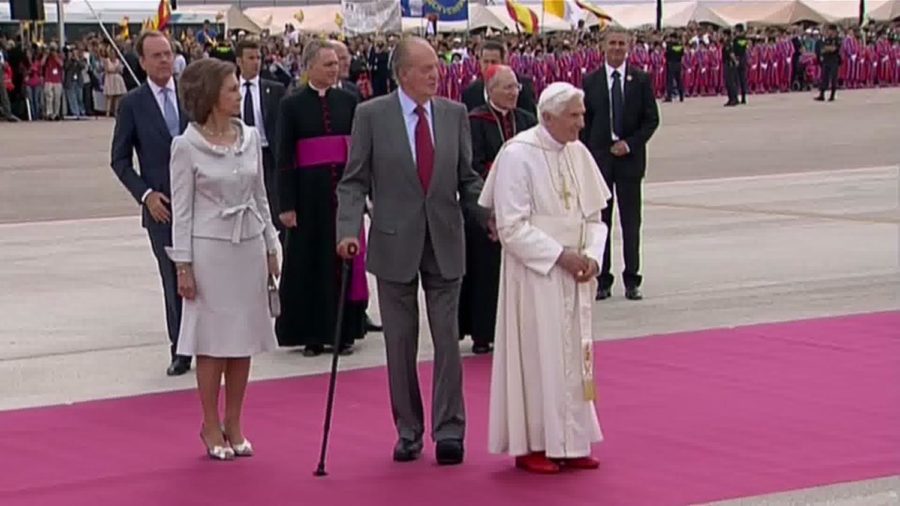What’s next after pope resigns?
Photo courtesy of CNN Wire Service
Benedict XVI arrives in Madrid on Aug. 18 for World Youth Day. He was met by Spain’s King Juan Carlos and Queen Sofia.
February 28, 2013
Approximately 22 percent of America is Catholic, which makes Catholicism a serious catalyst for domestic change when its power is measured from political, social and economic perspectives.
This religion is also prominent in other parts of the world, and that is why Christopher Chase, lecturer of religion and philosophy at Iowa State, believes it’s important to consider the affairs of the church.
“The political power and the social power of the church waxes and wanes,” Chase said.
Currently, the Catholic faith is, in fact, experiencing much growth in many parts of the world, especially Latin America and Africa. With Pope Benedict XVI retiring on Feb. 28, the world has turned its attention to the future of the church and the problems it faces, as well as the problems it can solve.
Some failed states in Africa, for example, have turned to the social hierarchy the Catholic church offers, Chase said.
In addition to hierarchy and historical factors, Chase said there may be other, more contemporary reasons for why Africa has embraced Catholicism, among them being missionary work.
“[Missions are] almost never solely about delivering a particular theological message. There’s always a social context,” Chase said.
“Traditional Catholic social teaching … is to take care of those who are not being taken care of by the world.”
With the rising number of Catholics in Africa, the possibility of a new pope from Africa exists. Chase said he thought the odds were against it at this point, but that there was a chance it could happen.
“There are a lot of people who would like to see … the top of the church reflect in some way the history and diversity of where it’s growing strongest,” Chase said.
“The fact is that it was such a surprise to so many people to see the current Pope abdicate that I … wouldn’t be surprised to see something unusual happen.”
The pope retiring is, in itself, considered by many to be unusual. A pope’s resignation has not occurred in the last 600 years.
“That position requires a lot of physical, mental and spiritual stamina, and he’s just decided, for the good of the church, it needed somebody younger,” said Father Jon Seda from the Ames St. Thomas Aquinas church.
Pope Benedict is currently 85 years old.
Seda said Benedict’s time as pope was distinguished partially by the fact that one of the changes he has been responsible for has been the nomination of “more and more” cardinals from the third world.
“By announcing his resignation, Pope Benedict is giving the Cardinals time to gather in Vatican City and prayerfully consider who would be a good choice to be the Pope at this point in history,” said Anne Clifford, associate professor of philosophy and religious studies and Catholic expert at Iowa State, via email.
“The current plans announced by Vatican spokespersons indicate that a new pope will be in place for the celebration of Easter, which, for western Christians, is on March 31.”
Clifford went on to say that more than 100 voting cardinals will elect the next pope. Two-thirds of the cardinals must vote for him, and the elected person must accept the position formally.
“There is a special chimney put in the Sistine Chapel, and when there is somebody who is elected pope, they put something in the fire that makes it white smoke instead of black,” Seda said.
“That’s when the people of St. Peter’s Square know … the new pope will emerge on the balcony and be introduced to the world.”
The importance of the pope, Seda said, lies in the fact that he is a symbol of the church’s unity. Other tasks the pope is responsible for include appointing bishops and responding to the rest of the world on behalf of the church.
Due to recent sexual abuse scandals, the church, Chase said, has lost a lot of the world’s trust. This is a problem that, no matter where the next pope is from, will need to continuely be addressed and responded to by the church.
Chase said how the top of the Catholic hierarchy conducts its business “can certainly make a difference as to how things get done at a local parish.”
This is true throughout the world.
“It’s important to follow [Catholic] trends because, really, in so many social, economic and political ways, the Catholic community is vast enough to cause social change merely by its moving in one direction or another,” Chase said. “It’s definitely worth watching.”







